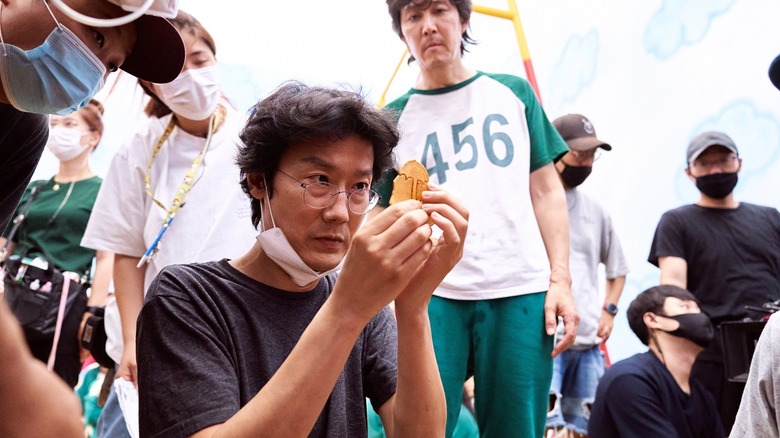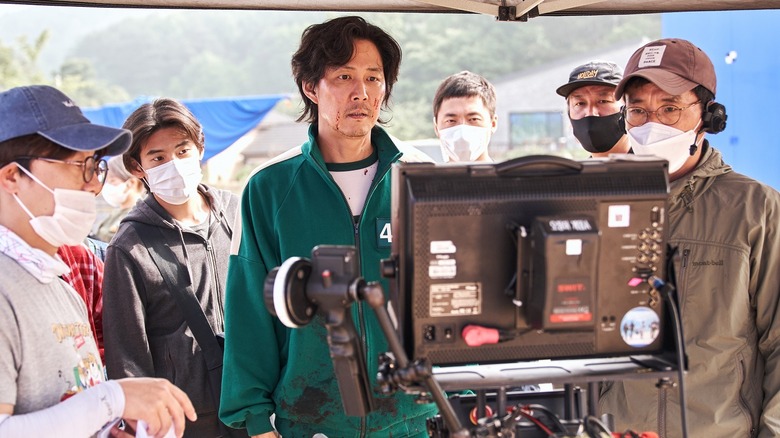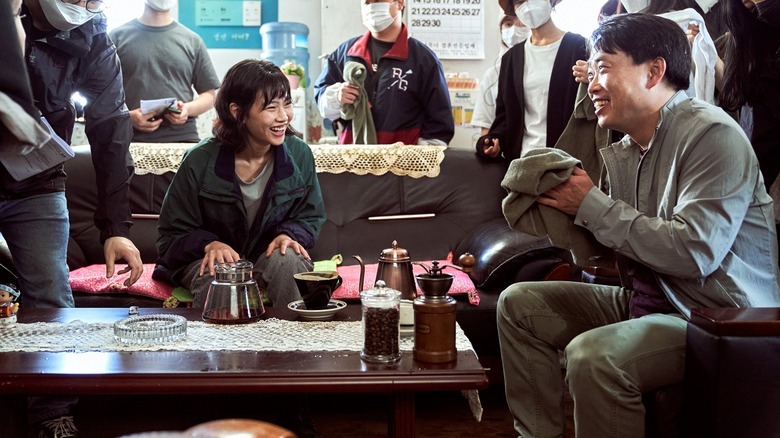How Squid Game Went From A Movie To A TV Show
This content was paid for by Netflix and created by Looper.
"Squid Game" might seem like an overnight success story, with the Korean-language survival drama becoming Netflix's most-watched series launch faster than the first winner of the "Red Light, Green Light" challenge. However, for writer-director and creator Hwang Dong-hyuk, it took over a decade and some fundamental formatting shifts before he finally saw his vision realized on the screen. In fact, if "Squid Game" had been made when Hwang first came up with the concept, it would've been a movie instead of the nine-episode series that has captivated so many.
It may be hard for fans of the dystopian series to imagine all of that "Squid Game" action condensed into one feature-length film, but that's exactly how Hwang first envisioned the story being brought to life. Hwang has since lifted the veil on how exactly he managed to turn his initial film idea into a worldwide sensation of a series, so let's take a deeper look at how "Squid Game" went from a movie to a television show.
Squid Game's unfortunate inspiration
When Hwang first came up with the idea for a "Squid Game" movie, it was back in 2008 amid the global economic crisis that affected every level of society, including Hwang himself. As Hwang told The Hollywood Reporter, after he was unsuccessful in selling one of his already-completed film scripts, he experienced some financial hardships, and at the same time, he was also digging into death game manga series like "Liar Game" and "Battle Royale."
"I read some stories about these indebted people entering into these life-and-death games, and that became really immersive for me because I was struggling financially myself. I was even thinking that I would love to join a game like that, if it existed, to make a bunch of cash and get out of this terrible situation," Hwang explained. "And then that got me thinking, 'Well, I'm a director. Why don't I just make a movie with this kind of storyline?'"
By the following year, Hwang completed his first script for a film version of "Squid Game," and several of the characters, including Hwang Jun-ho (Wi Ha-jun) and Hwang In-ho (Lee Byung-hun), were named after his actual friends. And characters like Seong Gi-hun (Lee Jung-jae) and Cho Sang-woo (Park Hae-soo) also featured portions of his own personality. That was just the start of his creative journey on the story, however.
A second chance
After Hwang's initial script for "Squid Game" was complete, he was met with some icy reception by Korean studios, which passed on the picture as being too unrealistic and gruesome. So Hwang put the story aside and went to work on several other movies, including "Silenced," "Miss Granny," and "The Fortress." However, the ongoing hardships of the world continued to affect Hwang's creative process, and the concept of such a brutal game became far less abstract, thanks in part to the success of other dystopian stories like "The Hunger Games."
As Hwang explained to IndieWire, "The concept itself was not realistic at the time 10 years ago. It was too bizarre, and people thought it wouldn't be a money-making film." Hwang's decision to dust off his script for "Squid Game" was due in part to the changing world around him. "It's a sad story, but 10 years later, the world has become a world where such a ridiculous survival story fits well," he said to Chosun. "When I make it now, people say, 'It's fun. It's realistic.'" Then, in 2018, Hwang approached Minyoung Kim, a content officer for Netflix's then-new Asia division, with the story, and she was already familiar with Hwang's film work.
"He had been a respected filmmaker for a long time," she told Fortune. "Everybody wanted to know what his next project was. But we were early in the business and just opened our office. [I remember] having a conversation with him in our small WeWork office space, with our small [team] ... [W]e were looking for shows that were different from what's traditionally 'made it,' and 'Squid Game' was exactly it."
A new start
After receiving the green light to create the show, Hwang finally set to work transforming his original film script into the "Squid Game" series we all know and love so well. But returning to work on the story did require Hwang to set aside some hurt feelings about how long it took. As he told The Hollywood Reporter, "When I opened up the files again to rework it and read through all of the scripts and the emails that I exchanged with all of the people around me back then, I actually had a moment where I broke down and cried. ... A lot of hardship is ingrained in this show — but then it became a blockbuster worldwide success. So there have been a lot of different layers of feelings. Of course, I'm exhilarated about the success."
In addition to detailing his difficult journey to bring "Squid Game" to life, Hwang has also talked about some of the differences audiences would've seen in "Squid Game" film instead of the series. For one thing, although the number of players being 456 is now a signature element of the series, he originally pictured the game as featuring 1,000 people competing for 10 billion won. However, due to inflation over the decade to follow, he decided to raise the stakes a bit for the series.
The series format also gave Hwang an opportunity to expand the characters' individual development, which has also become a major part of why "Squid Game" is such a compelling show. As he told IndieWire, "When it was originally written as a film script, I had to concentrate on just the games because it was just two hours. But now that it's a nine-episode long series, I could focus on the relationships between people [and] the stories that each of the people had."
Although the journey to make "Squid Game" wasn't an easy or expedient one for Hwang, the massive success of the show proves that he was right to stick with the story and see it through to the screen.


